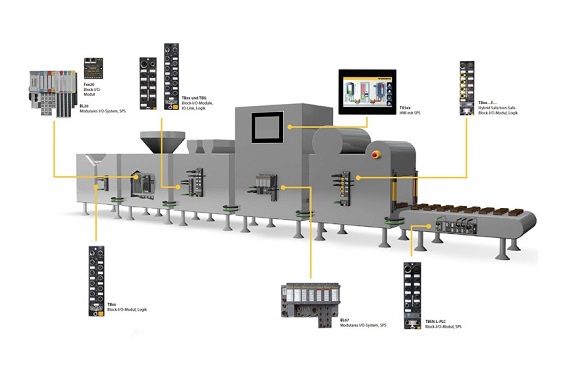|
|
 |
 |
 |
 |
| |
Turck Banner lead the charge on Battery production and Hydrogen solutions
2
December
2024
|
| |

Process and Control Today’s Greg Horsley had the pleasure of attending and reporting on an event recently where Tony Coghlan, Managing Director, and Ian Manning, Marketing Manager, of Turck Banner discussed battery production and hydrogen solutions and how utilising Modular Type Package (MTP) can help…
The desire to move away from fossil fuels has driven the need for improved battery technology and hydrogen solutions, to replace the petrol or diesel internal combustion engine in all vehicle types.
You would need a crystal ball to be able to predict which of these technologies will come out on top. From a consumer point of view, both have their Pros and Cons.
While hydrogen has the advantage of fast re-fuelling, production costs are higher and re-fuelling stations are scarce.
Although electric vehicles have lower operating costs, their initial purchase cost is higher and recharging takes longer. However the infrastructure for electric vehicles is far more established than hydrogen.
The hydrogen infrastructure will have to be massively expanded in the coming years – be it in the provision of electrolyzers and other plants for hydrogen production, pipelines and ships for transport, tanks and other storage technologies, or fuel cells and other plants for using hydrogen.
As with any developing technology, manufacturers have to take steps into the unknown which can lead to areas of instability in the manufacturing process. To illustrate this point, if a product is well established and has not changed fundamentally in a long time, all of the areas where problems occurred during manufacturing, have already been discovered and dealt with. When a new product line is constructed, all of these problem areas can be avoided.
Another challenge faced by these pioneering manufacturers is time-to-market and managing the constant changes brought on by rapid development.
With so much competition in these markets, manufacturers cannot afford the time needed to plan, build, program and test a new production line using traditional methods. In the 5-6 years it typically takes to do this, either a competitor has developed an alternative or their own R&D department has made an improvement.
This time-to-market can be significantly reduced by using modularity, either as a function of breaking the production line into sections, where each section has independent control and intelligence but is still dependent on individual manufacturer’s products, or by utilising MTP.
Modular Type Package (MTP) is a manufacturer independent interface which describes a module’s functions. The module’s internal control system implements the functions in the same way that a manager delegates a task to an assistant. The higher level control system doesn’t need to know how the module implements the function, just that it is being done.
The modular approach works because many parts of a manufacturing process are common with other processes. This means that a common section, with its own control and intelligence, can be dropped into the whole line, needing only to interface with the sections up- and downstream of itself and with the overall control system.
The MTP approach also simplifies the overall control system and programming, and can have the greatest effect on time-to-market, with a possible reduction of 2-3 years.
This modularity also facilitates the ability to incorporate changes during and after construction, where a more traditional approach may have required a complete redesign, or extensive reprogramming. The number of different types of battery cell required to fit all of the different vehicle types demands flexibility in the production line, and modularity is key to achieving this.
Turck Banner Ltd have all the interface and sensor products required to enable MTP, decentralised automation and local intelligence. They also have an extensive product portfolio for condition-based monitoring.
Areas of instability in manufacturing a new product are not just restricted to new processes. Many moving parts on a production line may be untested or have not had the opportunity for lifetime testing. Data-driven condition monitoring of these moving parts is essential to predict problems before they happen.
The cost of a product and the profitability of a manufacturing process is heavily dependent upon the availability of its manufacturing equipment, the continuous flow of the product throughout the process, and the quality of the final product. Condition monitoring is essential in maintaining the availability of the equipment. Remote monitoring of production flow and quality inspection provides real-time visibility for immediate intervention, and facilitates the tracking of trends in performance, to identify areas where improvements can be made.
Turck Banner’s wireless sensors and networks make it easy for manufacturers to position sensors where needed, to gather the performance data and also to relocate sensors to pinpoint areas for improvement.
Turck and Banner have decades of experience with process automation in explosion-proof areas and every industry sector. Turck are the only manufacturer who can provide Zone 2 IP67 remote I/O solutions, which can be mounted directly to the outside of a machine without the need for an enclosure. Turck and Banner’s combined portfolio of sensors, safety, lighting, indication, vision, fieldbus, networking, HMI, I/O, connectivity, measurement, interface technology and cloud solutions make them unique in their industry.
For more information, please contact:
Ian Manning
Turck Banner Ltd
Blenheim House
Blenheim Court
Wickford
Essex
SS11 8YT
Tel: +44 (0)1268 578888
Email: enquiries@turckbanner.com
Web:www.turckbanner.co.uk |
|
|
| |
FactoryEquipment.com are not responsible for the content of submitted or externally produced articles and images.
Click
here to email FactoryEquipment.com about any errors or omissions contained within this article. |
| |
|
 |
|
 |
 |
|